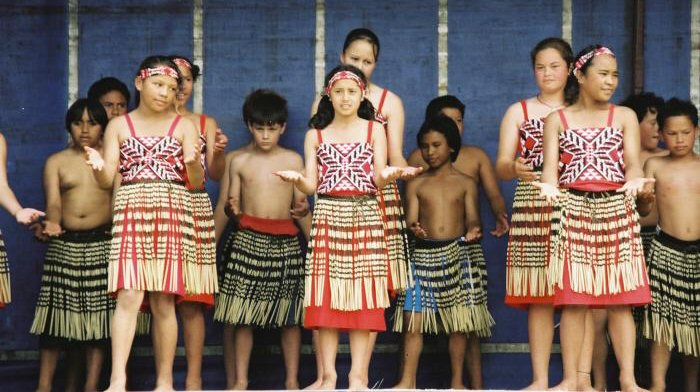Kapa Haka is the traditional tribal Dance of the Maori People on Aotearoa (New Zealand).
The meaning of the term Kapa haka includes waiata-a-ringa (action songs), waiata tawhito (ancient songs that tell of historic events) and the use of poi (a swinging ball used to train for dexterity).
Various kinds of haka (war dance) were performed by Māori warriors
before battle to unite them in anger or courage, and to intimidate the
enemy, using weapons such as the patu (short club) and taiaha (fighting
staff). The dance always came with body movement and expression. Besides
wars, the dance also expresses the lifestyle of each era: activities
such as labour through food gathering, fishing, hunting, warfare, and
socialization through various rituals, contributed collectively to this
tradition; Whānau (family) celebrations, as well as inter-tribal visits,
provided the opportunity for Māori to entertain in dance forms telling
of past events, whakapapa (genealogy), heroes, death, landmarks, and
rituals.
Today kapa haka is presented in two forms: for entertainment and
maintenance and also for competition. Both forms have an important place
for dance development in modern society. As well, the preservation of
Māori ritual is the marae (traditional gathering house) institution.
Joining the Māori Kapa Haka are Today’s modern styles such as Jazz, hip
hop, dances such social dance, Latin American, Middle Eastern and a
fusion of different dance forms.
Māori excel at singing, embracing every style from traditional waiata
and classical opera to all forms of modern-day music, including
Polynesian hip-hop. These performers and groups, along with many others,
have reached the heart of the Māori world and delighted audiences with
their performances.


Previous Page: New Zealand- The People
View Slideshows on New Zealand:
Māori links:
http://www.maori.org.nz/kapahaka/
http://www.nzqa.govt.nz/for-maori/resources/mpa/nmd/introduction.html
http://www.creativenz.govt.nz/resources/toi-maori.pdf
http://teiho.org/Default.aspx?instanceID=223

